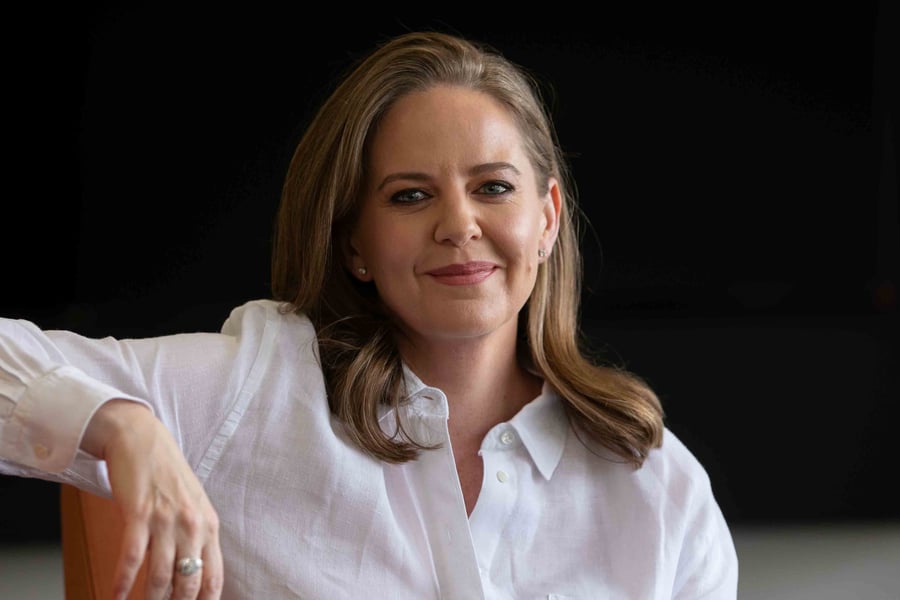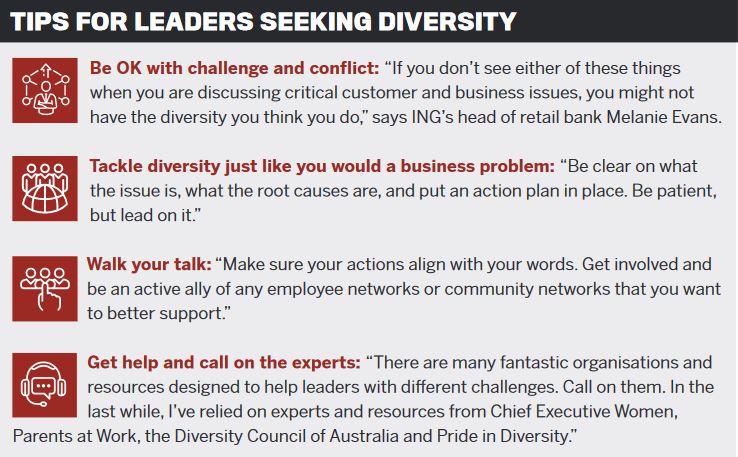From a young age, ING's head of retail bank has been aware of the need to embrace a diversity of views and strengths. She talks to MPA about the non-major's continuing journey towards greater inclusion

ING’S head of retail bank, Melanie Evans, grew up in a house where everyone was welcome around the dinner table, no matter who they were. Having lived with such an open-minded family, and seen her parents juggle their careers and responsibilities together, she owes much of who she is now to her early experiences.
Her parents taught her about hard work, and having an older brother taught her about resilience and persistence.
“Chasing the coat-tails of an older sibling certainly toughened me up. There were many things I couldn’t do, but boy, did I learn to try!” she says.
There was always a newspaper on the table, and rather than talking about homework or trivial topics, there were often discussions and debates on what was going on around the world. As she moved through her career, Evans found that the best leaders were those who understood these wider perspectives – the perspectives of the customer, community and team members.
“I think about that a lot, so I consume a lot of content, try to connect with people not like me, ask a lot of questions when I meet people,” she says.
Evans also played a lot of competitive sport from a young age, which she says taught her how to learn, practise, prepare and be disciplined. In team sports, too, she learnt it was important to appreciate those around you who may have the skills you don’t.
“Sometimes we can overcomplicate diversity and inclusion, but what you’re aiming for is quite simple”
Throughout her 25 years in the finance industry, including a cadetship in banking, Evans says she has also benefited from observing leaders tackle significant challenges.

Name: Melanie Evans
Company: ING
Title: Head of retail bank
Years in the industry: 25
Career highlight: “Being given the career advice to chase experiences, not job titles and status quo”
A passion for diversity and inclusion
Growing up aware of these other perspectives, Evans understands how important diversity and inclusion are. She says she gets frustrated knowing that there are people who do not feel like they belong, or who are not cared for or respected because of their differences.
“I have benefited from living a life surrounded by people so very different to me,” she says.
“Those who have no interest in opening up opportunities to others who are different to them are either ignorant of the broader world in which we live or are acting in their self-interest. It might be unconscious, but it doesn’t make it OK.”
Evans has also seen first-hand the benefits of diversity and inclusion, having worked with progressive and modern leaders who afforded her opportunities that others may not have.
For example, during her career she has experienced community and professional programs that were designed specifically to support diversity; these not only helped her develop but opened her eyes to the challenges and issues she was not aware of.
Diversity remains an incredibly important issue today, and Evans says businesses need to be aware of the positive impact it has.“We are a very successful melting pot as a nation, and while the employee base of financial services doesn’t reflect that in 2020, the best customer-focused firms spend a lot of time understanding the very diverse segments of Australia – and what opportunity that can bring your business,” she says.
ING focuses on diversity along two fronts: with its customers and its own workforce. It has formed a Diversity and Inclusion Council, of which Evans is chair. She attends sessions and takes part in as many activities as she can, ensuring that the bank’s executive committee is always aware of the areas that need to be focused on. This makes sure the themes come from the ground up, not the top down.
Setting up a council is not all ING has done. The non-major established a Rainbow Lions network so LGBTQI+ employees could feel included, respected and valued.
Its Lioness network also champions female empowerment and aims to build a gender-equal society. Evans explains that around 30% of this network’s members are men who want to contribute to gender equality. The group runs mentoring programs, events, leadership sessions and provides other development opportunities.
Thanks to a shift in the terminology that ING uses around primary and secondary caregivers, any parent in the organisation can take 14 weeks’ parental leave.
“In the last 12 months we have seen a fourfold increase in male team members taking more than two weeks’ leave to share the care and enjoy family life,” Evans says.
Better equipping businesses
For brokers who want their teams to succeed, diversity and inclusion is vital. Evans says that in a competitive environment like broking, every single member of the team needs to deliver an exceptional experience to customers and workmates, and that only comes from a workplace people enjoy and feel they belong in.
“I consume a lot of content, try to connect with people not like me, ask a lot of questions when I meet people”
“A diverse and inclusive workplace is one where employees feel comfortable enough to be themselves,” she says.
“Sometimes we can overcomplicate diversity and inclusion, but what you’re aiming for is quite simple.
“It also brings diversity of thought and means that as a business you’re better equipped to relate to your customers.”
To work towards greater diversity in their businesses, Evans says leaders need to be aware of the different perspectives and identities people have.
“Challenge your own assumptions,” she says. Something ING does is encourage staff to talk about what they do outside of work so their team can better understand the experiences and perspectives they can bring to the table.
Evans also warns that leaders need to be OK with conflict, saying diversity is not just about visible things but about “know-how, life experience and different ways of tackling a problem”. She adds that this awareness of how wide the diversity piece can be is growing, and while it is a good thing, there is still a way to go.
“I am not a believer in explaining away lack of diversity to legacy and industry structure,” she says. “If you spend all your time focusing on that, you don’t have your eye on what is ahead of you.
“It’s really important to emphasise that we can too easily let perfect get in the way of progress. Progress is good for customers, good for team members and good for business.”




